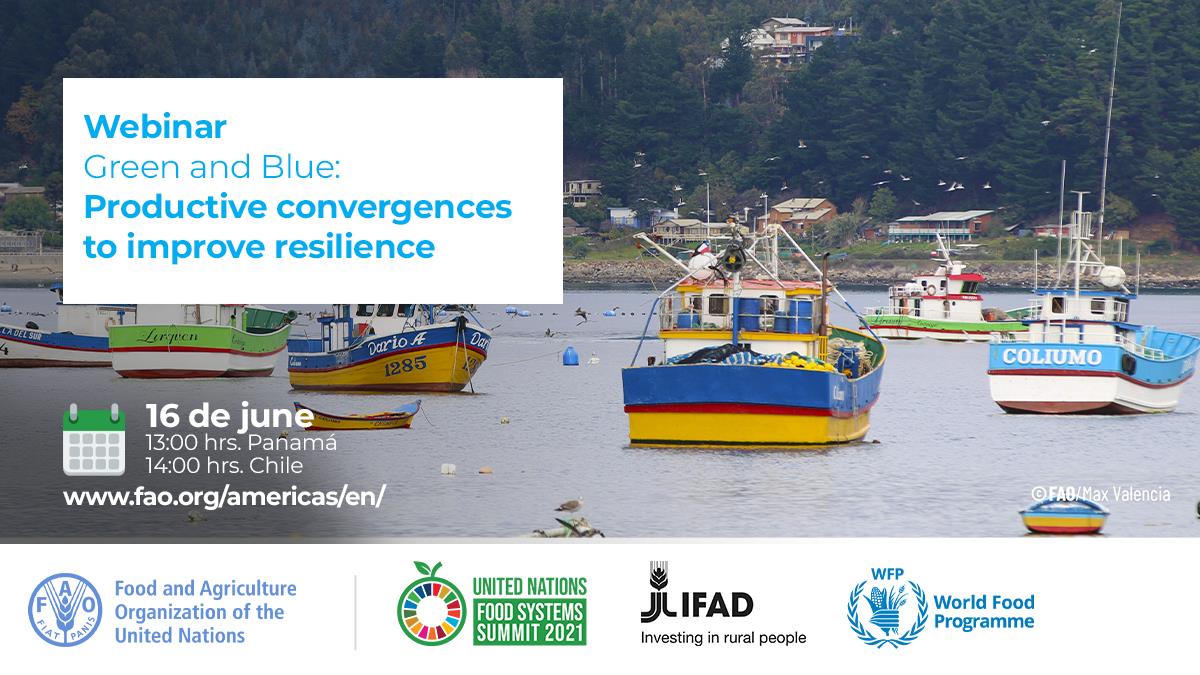Green and Blue: Productive convergences to improve resilience
Hybrid Event, 16/06/2021

Rationale
In order to address climate change, Nationally Determined Contributions (NDCs) establish goals for the reduction of greenhouse gas emissions to prevent the global temperature increase exceed 2 ° C. These NDCs highlight the importance of promoting more sustainable practices in agriculture, aquaculture, forestry, and other land uses, contributing to mitigation efforts. Some of the approaches used for more effective climate management include climate-resilient agriculture and aquaculture, integrated landscape management, and watershed management.
In terms of scale, the landscape approach seeks to understand and address the socio-environmental relationships within a territory integrating food systems and considering the conservation of biodiversity and its ecosystem services; the population’s livelihoods and the governance and institutional framework. This, to build adaptive capacities and GHG mitigation efforts, which are catalysts of climate change.
In terms of the productive systems, new trends direct efforts towards productive integration and promoting the growth of climate-resilient agriculture, fishery, and aquaculture, by improving location, genetic and feed management; sustainable water management practices; productive synergy; and strengthening emergency procedures and biosecurity measures.
Agro-aquaculture is one of several alternatives for environmentally efficient food production, based on its ability to generate synergies between agriculture and small-scale aquaculture contributing to their resilience. This climate-resilient agriculture can contribute to the sustainability of food systems, based on a circular economy approach, which promotes economic growth through closed-loop systems, new market opportunities and climate change mitigation because of the efficient use of resources.
Objectives
This event is part of a series of conferences promoted by FAO/IFAD/WFP and linked to the Food Systems Summit. It aims to exchange experiences and measures that governments and producer organizations are adopting in the field of climate-resilient agriculture and blue economy to transform the food systems and achieve Sustainable Development Goals.
The main goals of this webinar are:
- Exchanging good and innovative practices in institutional matters, public policy and productive solutions implemented in countries of the region, to face the direct and indirect effects of climate change on the food systems, agriculture and fishery.
- Share reflections and innovative proposals to promote climate-resilient agriculture that leads to recovery with transformation.
- Show the relevance of a systemic approach and identify synergies between the different sectors.
Structure of the webinar
This webinar includes short presentations by speakers who are key players in the agricultural sector and the blue economy, both from the governmental perspective and from the agricultural organizations and FAO. The seminar focuses on reflection and response to a series of questions that allow the exchange of ideas and successful measures adopted in countries of the region to face the climate crisis, such as:
- What are the challenges that climate change raise to the food systems?
- What actions should be implemented to strengthen resilience in agricultural and fishery production?
- What successful examples of innovation in public policy and institutions are important to share to face climate change challenges in agriculture and fishery?
- How to promote support of financial institutions to move towards more climate-resilient agriculture?
- How can we promote circularity to achieve climate-resilient agriculture?
- How can we take advantage of the synergies between the different productive sectors to achieve recovery with transformation?
The event will be held through the Zoom platform and broadcast on YouTube. Will last 60 minutes.
Documents
Related links
- Food Systems Summit 2021
- Food and Nutritional Security Platform CELAC 2025
- FAO Regional Initiative on Sustainable Food Systems to Provide Healthy Diets for All
- COVID-19 and Food Systems in Latin America and the Caribbean
Relationship with Sustainable development Goals
Contact
María Elena Alvarez
Communicator Regional Initiative Sustainable Food Systems to provide healthy diets for all
